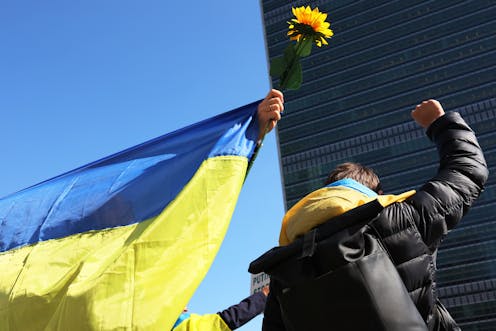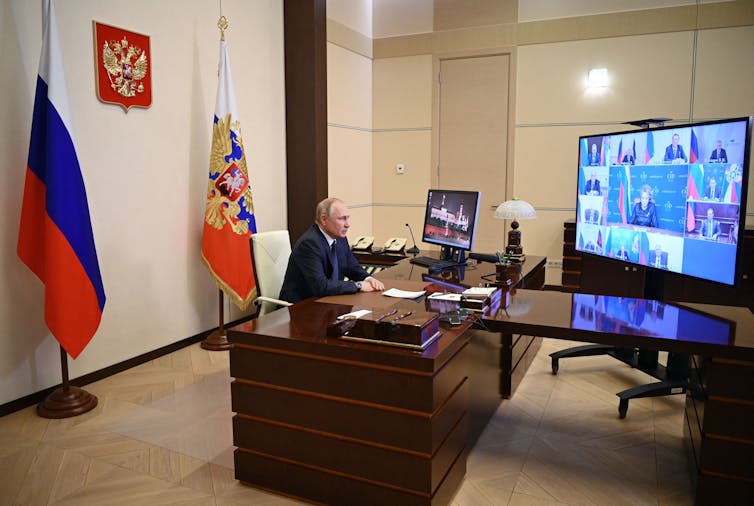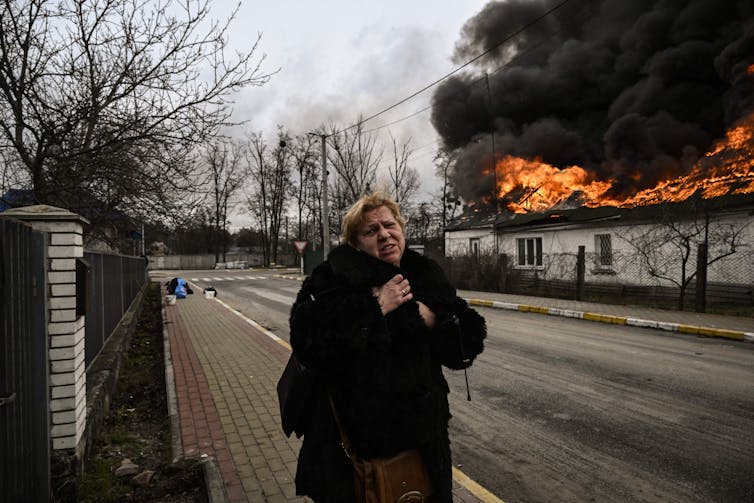
When Russian President Vladimir Putin announced a “special military operation” in Ukraine on Feb. 23, 2022, the U.N. Security Council was conducting an emergency late-night meeting chaired by Russia on the mounting crisis.
Western powers expected the invasion to happen, but Putin’s timing marked an unprecedented rebuke to the U.N., the global body uniquely tasked with maintaining international peace.
The political move also resurfaced a recurring question. Is the United Nations, a 77-year-old international institution, still relevant?
As a research professor on human rights and the law, I believe that despite the limitations of the Security Council this war exposes, international law and the U.N. remain essential to humanity’s survival.
How does the Security Council work?
The U.N. is the only international organization that has membership of 193 countries. It has various ways countries can meet and agree to action on international challenges. The U.N.‘s offices and agencies are tasked with everything from outer space affairs, human rights and nuclear nonproliferation to women’s health, education and climate change.
The U.N. Security Council is the U.N.’s most powerful political body. The council is made up of representatives of 15 countries that consult and vote on international security decisions.
Five countries with proven nuclear powers – China, Russia, France, the United States and the United Kingdom – hold permanent seats on the council. These countries, called the P-5, gained these spots when the U.N. was established shortly after World War II, given their perceived importance in preserving world peace.
P-5 countries can veto the council’s proposed decisions. But if approved, these resolutions are binding under international law and can, for example, establish sanctions regimes, deploy a U.N. peacekeeping mission in a country or authorize use of force, as the council did in Libya in 2011.
Without its own military, the council’s use of armed force to restore peace has a fraught and complicated history. NATO is often engaged in carrying out the few military interventions the council has authorized, as during the Bosnian war in 1992.
The U.N. also has 70,000 military peacekeeping personnel. But these peacekeepers primarily monitor cease-fires or peace agreements, with the consent of the countries concerned.
As expected by international observers, Russia vetoed a Security Council resolution on Feb. 25, 2022, that deplored its invasion of Ukraine and called for it to withdraw military forces.
Russia was the only country on the council that blocked the resolution, exposing the limited leverage the U.N. has over the world’s most powerful countries.
As a result, the U.N. faces heightened criticisms of its inability to act on the crisis.

What could the UN actually do, then, about the Ukraine war?
Even if the Security Council cannot easily authorize action on Ukraine, the U.N. can influence the war in other ways, as through political pressure, legal decisions and investigations, and humanitarian assistance.
During the Korean War, U.N. countries foresaw the problem that P-5 members might not be able to jointly act during a conflict.
The General Assembly – another U.N. decision-making body that includes all member countries – can also approve resolutions on conflicts. But the General Assembly lacks the legal authority the Security Council holds.
The General Assembly approved a resolution in 1950 that grants it the authority to act, based on a referral from the Security Council, if the council cannot reach a decision on the use of armed force or other issues. The council’s referral is a procedural matter, so the veto does not apply.
Using this mandate for the first time in 40 years, the General Assembly adopted its own resolution on Ukraine on March 2, 2022. The resolution calls for Russia to withdraw its military troops from Ukraine. The General Assembly’s action demonstrates Russia’s diplomatic isolation.
The U.N.’s Human Rights Council is one other body with potential leverage during the Ukraine war. But this council cannot legally require countries to take action on their decisions. A range of countries with egregious human rights records, like Saudi Arabia and Russia, are also members of the council.
The Human Rights Council launched an investigation of potential human rights violations in Ukraine on March 4, 2022, as evidence mounts that Russia’s military appears to be targeting civilian infrastructure and committing war crimes.
The U.N. also has a pivotal role to play in crisis response and humanitarian assistance. The U.N. refugee agency and other U.N. groups are documenting the intensifying refugee crisis and [providing food, medicine and other lifesaving aid] to help more than 6 million Ukrainians in need.
Ukraine is also seeking a decision by the International Court of Justice, the main judicial organ of the U.N. Notably, enforcement of its rulings depends on countries’ agreeing to uphold them domestically.

What can be done about the Security Council?
This crisis has raised new questions about whether Russia has a legitimate role on the Security Council. Ukraine has asked whether it was legal for Russia to take over the Soviet Union’s seat when the USSR collapsed in 1991.
But a push to eject Russia from the Security Council faces formidable challenges.
Such a decision would be subject to the P-5 veto, as would any move to suspend Russia from the U.N. entirely.
Even though Russia is very unlikely to lose its spot on the Security Council, expanding the council’s permanent membership to more countries could potentially change the playing field.
Security Council reform has been under consideration at the U.N. since 2005. But proposals for change have not garnered enough countries’ support to actually move forward to gain approval at either the General Assembly or the council.
The Ukraine crisis will likely strengthen arguments for expanding the council. Such reform, however, might be slow in coming.
Uncharted territory
Experts point out that the price to pay for operating a complicated, international system like the U.N. is accepting some limits. But it is difficult to overcome critiques that the U.N. is often just talk when diplomacy fails to avert an unjustified war of this scale.
The Security Council’s track record on maintaining peace and deescalating conflicts has had some success, as in El Salvador, Nicaragua, Namibia, Mozambique, Sierra Leone, Cambodia and East Timor. Conflicts between countries have overall declined notably since the end of the Cold War.
There is no competing legitimate forum to which countries can go to theoretically maintain international peace and security. And the overwhelming majority of countries view Russia’s invasion of Ukraine as also an attack on the international community itself. Now, the question is whether the U.N. will emerge ultimately stronger, not weaker, from this crisis.
I previously worked for the U.N.
This article was originally published on The Conversation. Read the original article.







